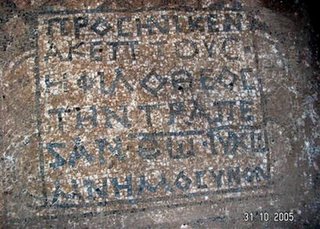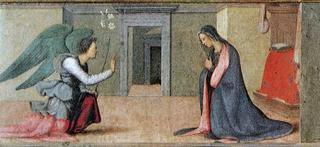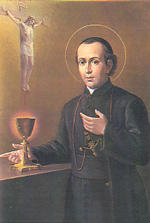
From the Vatican Information Service:
THE LITURGICAL REFORM OF VATICAN COUNCIL II (Proposition no. 2)
"The synodal assembly gratefully recalled the beneficial influence that the liturgical reform implemented following Vatican Council II has had for the life of the Church. This reform has highlighted the beauty of Eucharistic action, which shines out in the liturgical rite. Abuses have occurred in the past, nor are they lacking today though they have to some extent diminished. However, such episodes cannot darken the beauty and validity of the reform which still contains unexplored riches, rather they call for greater attention to 'ars celebrandi,' in which a privileged place must be given to 'actuosa participatio'."
EUCHARIST AND THE SACRAMENT OF PENANCE (Proposition no. 7)
"It is of vital pastoral importance that bishops in their dioceses promote a decisive revival in teaching the conversion that arises from the Eucharist, and that to this end they favor frequent individual Confession."
"The Synod strongly recommends bishops not to allow the practice of collective absolution in their dioceses, save in the objectively exceptional circumstances laid down in John Paul II's Motu Proprio, 'Misericordia Dei'."
"In this context, it is also necessary to dedicate more profound study to the dimensions of penance already present in Eucharistic celebration, in particular the penitential rite, so that people may experience true moments of reconciliation therein."
SHORTAGE OF PRIESTS (Proposition no. 11)
"The centrality of the Eucharist for the life of the Church means that the problem of the great shortage of priests in some parts of the world is felt very acutely. Many faithful are thus deprived of the Bread of life. In order to meet the Eucharistic hunger of the people of God, who are often forced to go without the Eucharistic celebration for considerable periods, it is necessary to implement effective pastoral initiatives.
"In this context, the Synod Fathers affirmed the importance of the inestimable gift of ecclesiastical celibacy in the Latin Church. With reference to the Magisterium, especially to Vatican Council II and to recent Pontiffs, the Fathers requested that the faithful be given adequate explanation of the reasons for the link between celibacy and priestly ordination, in full respect for the tradition of the Eastern Churches. Some reference was made to 'viri probati,' but it was decided that this was an untenable hypothesis.
"Furthermore, it must be borne in mind that, in offering the Eucharistic gift to all the faithful, the Christian quality of the community and its force of attraction have a decisive influence. It is particularly important to encourage pastors to promote priestly vocations, ... raise awareness among families, ... ensure (by bishops, with the involvement of religious families and maintaining respect for their charism) a more even distribution of the clergy, encouraging the clergy itself to a greater readiness to serve the Church wherever the need arises."
DIES DOMINI (Proposition no. 30)
"As a fruit of the Year of the Eucharist, the Synod strongly recommends that significant efforts be made to ensure that the 'Dies Domini' be valued and experienced by the entire Church. It is necessary to reaffirm the central position of Sundays. ... Truly, Sunday is the day in which, with others, we celebrate the Risen Christ, a holy day consecrated to the Creator, a day of rest and of openness."
"Through catechesis and preaching, Christians must be given the opportunity to meditate on the 'dies Christi' as the day of the resurrection of the Lord and, hence, as a feast of liberation, a day given as a gift during which to savor the goodness of the Kingdom of God."
"It is our hope, then, that the Day of the Lord may also become the day of Christians, respected by all society as a day of rest from work."
"Although Saturday evening is actually part of Sunday (First Vespers), and it is acceptable to fulfill the Sunday precept with a vigil Mass, it must be remembered that it is the day of Sunday itself that must be sanctified, that it may not remain 'empty of God'."
THE USE OF LATIN IN LITURGICAL CELEBRATIONS (Proposition no. 36)
"In celebrating the Eucharist during international meetings, which are becoming ever more frequent today, in order better to express the unity and universality of the Church it is proposed: that the (con)celebration of Mass be in Latin (except the readings, the homily and the prayer of the faithful), the prayers of the tradition of the Church should also be recited in Latin and, where appropriate, Gregorian chants be sung; that priests, beginning in the seminary, be trained to understand and celebrate Mass in Latin, as well as to use Latin prayers and to appreciate the Gregorian chant; that the possibility of educating the faithful in this way not be overlooked."
DIVORCED AND RE-MARRIED CATHOLICS AND THE EUCHARIST (Proposition no. 40)
"In keeping with the numerous pronouncements of the Church's Magisterium, and sharing the anxious concern expressed by many Fathers, the Synod of Bishops reaffirms the importance of attitudes and a pastoral actions that express attention and welcome towards divorced and re-married faithful.
"According to the tradition of the Catholic Church, they cannot be admitted to holy communion, being in a position of objective contrast with the Word of the Lord which conferred on marriage the original value of indissolubility. ... Nevertheless, people who have divorced and re-married still belong to the Church, which welcomes them and follows them with special attention that they may cultivate a Christian lifestyle through participation in Mass (though without receiving communion), listening to the Word of God, adoring the Eucharist, prayer, participating in community life, confidential dialogue with a priest or a master of spiritual life, dedication to living charity, works of penance, and educational commitment to their children. If, then, the nullity of the matrimonial bond is not recognized and objective conditions arise that render cohabitation irreversible, the Church encourages them to commit themselves to live their relationship in accordance with the law of God, transforming it into a firm and faithful friendship; thus they will be able to return to the Eucharistic table, receiving the attention laid down by time-honored ecclesial practice. But such relationships should not be blessed, so as not to create confusion among the faithful concerning the value of marriage.
"At the same time, the Synod hopes that all possible efforts be made both to ensure the presence, pastoral character, and correct and swift activity of ecclesiastical tribunals for causes of the nullity of marriage, and to dedicate further study to the essential elements of the validity of marriage, also bearing in mind the problems emerging from the profound anthropological transformations of our times, by which the faithful themselves risk being conditioned, especially given the lack of solid Christian formation."
ADMISSION OF NON-CATHOLIC FAITHFUL TO COMMUNION (Proposition no. 41)
"On the basis of the communion of all Christians, which the single Baptism already accomplishes though not yet completely, their separation at the Lord's table is rightly felt as being a source of pain. As a consequence, from both within the Catholic Church and from our non-Catholic brothers and sisters, the urgent request often arises for the possibility of Eucharistic communion between Catholic Christians and others. It must be made clear that the Eucharist does not designate and effect only our personal communion with Jesus Christ, but above all the full 'communio' of the Church. We ask, therefore, that non-Catholic Christians understand and respect the fact that for us, in accordance with the whole of biblically-founded tradition, Eucharistic communion and ecclesial communion are intimately connected, and thus that Eucharistic communion with non-Catholic Christians is not generally speaking possible. Even more so is ecumenical concelebration to be excluded. However, it should be made clear that, with a view to personal salvation, admitting non-Catholic Christians to the Eucharist, the Sacrament of Penance, and the Anointing of the Sick, in certain particular situations and under specific conditions, is possible and even to be recommended."
THE EUCHARIST AND MIGRANTS (Proposition no. 45)
"The Synod, thanking those committed to this field, invites all bishops to exercise their pastoral care towards migrants. These faithful must be welcomed as members of the same Body of Christ, whatever their race, status or condition, especially in Eucharist celebrations. Christ's charity impels other local Churches and institutes of consecrated life give generous help to dioceses that welcome large numbers of migrants."
EUCHARISTIC COHERENCE OF CATHOLIC POLITICIANS AND LAWMAKERS (Proposition no. 46)
"Catholic politicians and lawmakers must feel their consciences particularly aroused ... by the heavy social responsibility of presenting and supporting iniquitous laws. There is no Eucharistic coherence when legislation is promoted that goes against the integral good of man, against justice and natural law. The private sphere and the public sphere cannot be separated, placing oneself in a position of contrast with the law of God and the teaching of the Church, and this must also be considered in Eucharistic terms. In applying this guidance, bishops should exercise the virtues of courage and wisdom, bearing in mind actual local situations."
THE SOCIAL DIMENSION OF THE EUCHARIST (Proposition no. 48)
"Christ's sacrifice is a mystery of liberation that calls out to us. It is in the commitment to transform unjust structures and to re-establish the dignity of man, created in the likeness and image of God, that the Eucharist assumes in life the significance it has in celebration. This dynamic movement opens up to the world: it questions the process of globalization which not infrequently increases the gap between rich countries and poor countries, it denounces the political and economic forces that dilapidate the earth's resources, it reiterates the grave requirements of distributive justice in the face of inequalities that cry out to heaven, it encourages Christians to commit themselves and to work in political life and social activity. ... Those who share in the Eucharist must commit themselves to creating peace in our world, which is marked by violence, war and, especially today, by terrorism, economic corruption and sexual exploitation. The conditions for building true peace are the restoration of justice, reconciliation and forgiveness."













